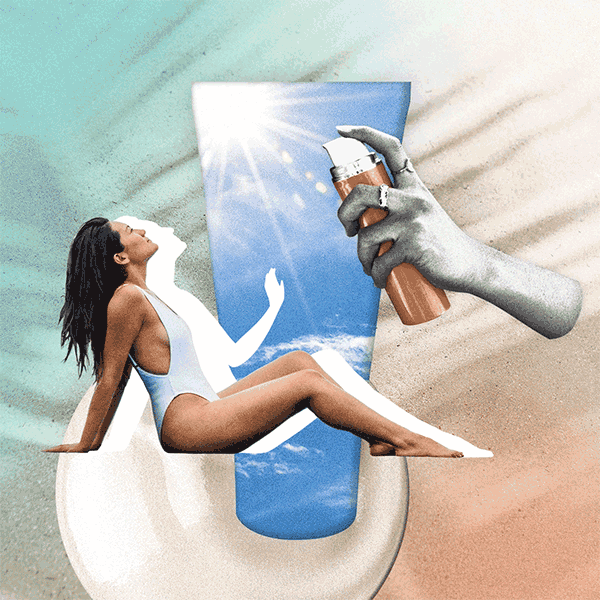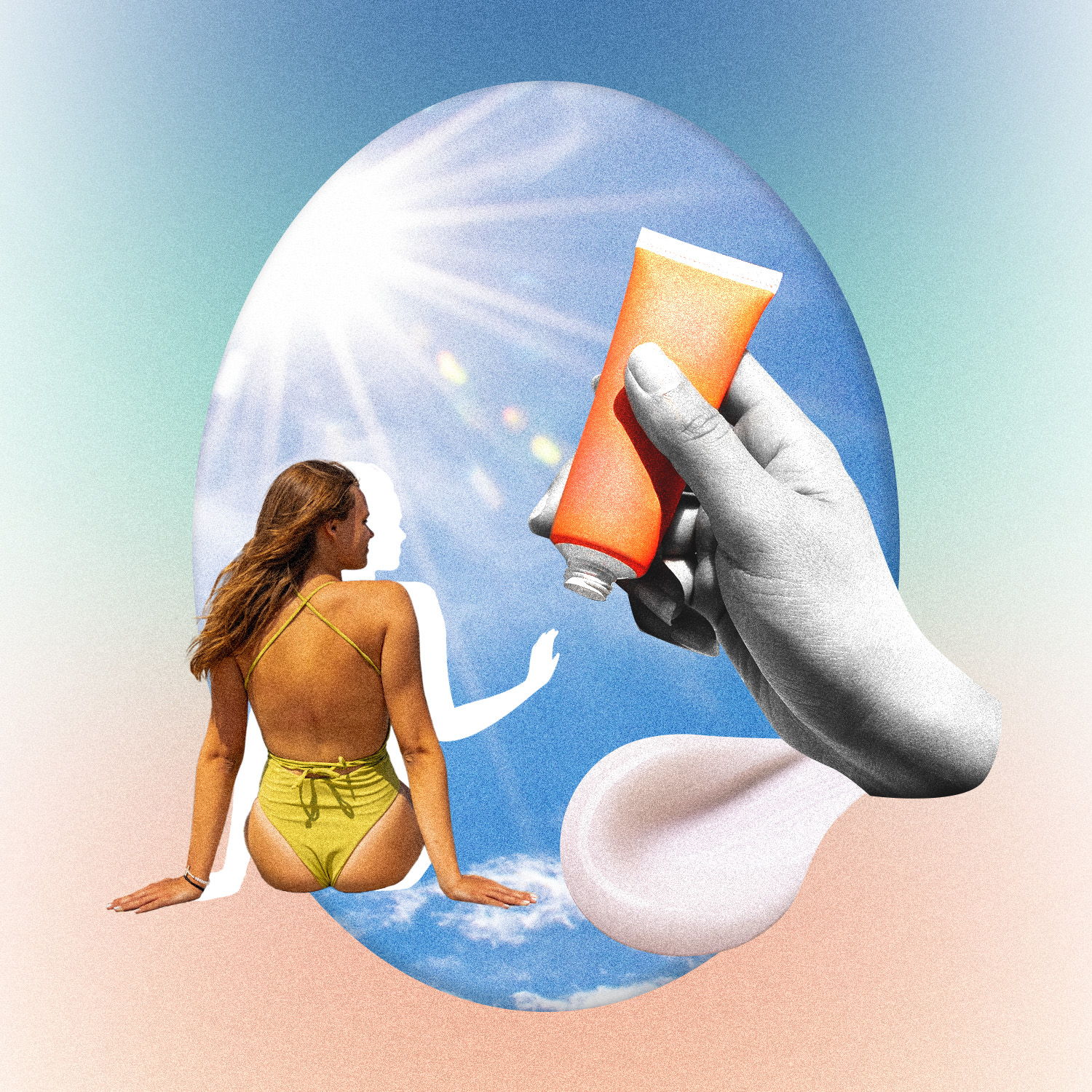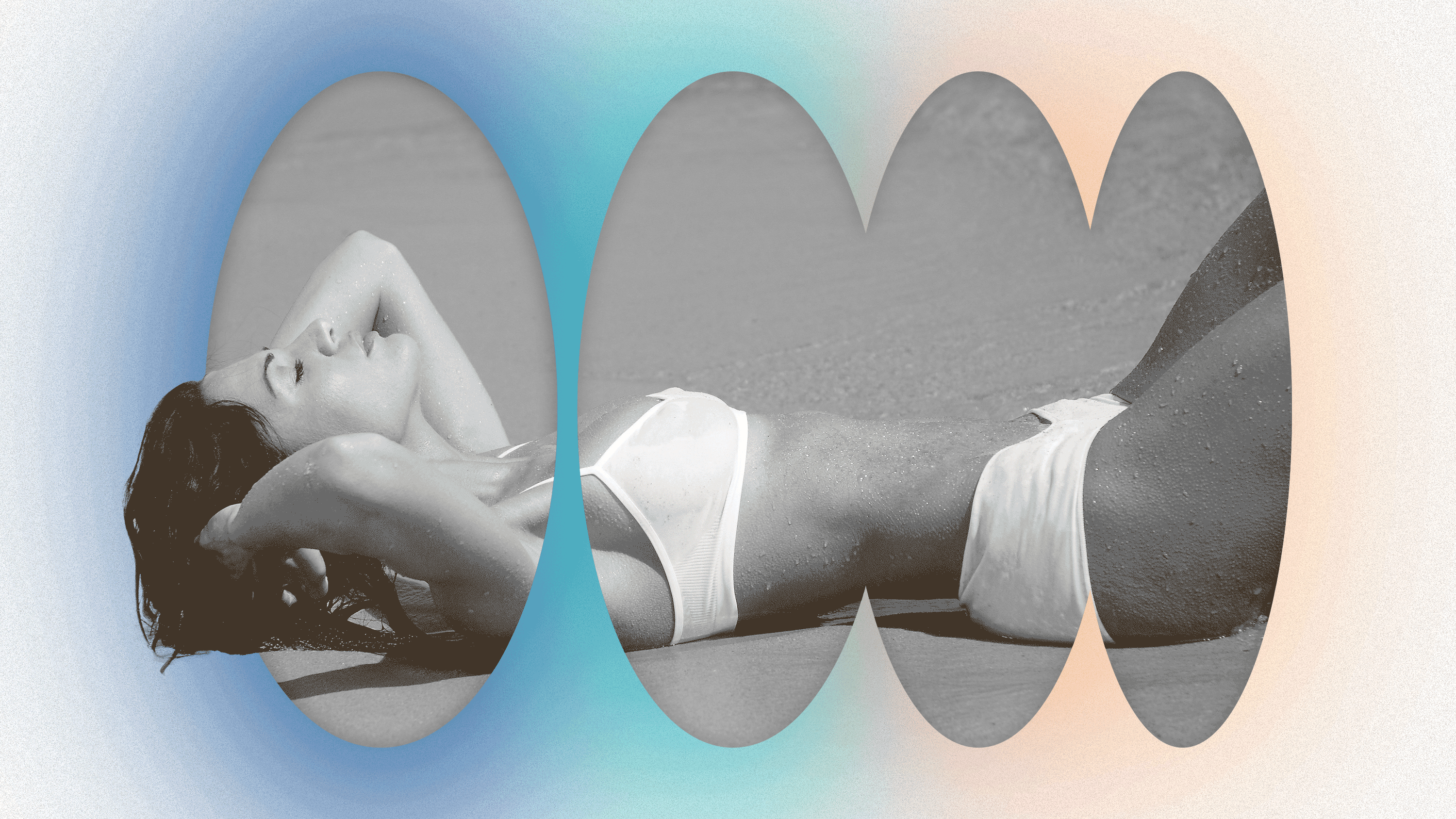
Some people prefer to discuss it anonymously. “I’ve given up on sunscreen,” is one Reddit thread. Another reads, “Do you think it’s necessary to wear sunscreen every day?” A quick search reveals online message boards filled with endless streams of equally skeptical questions and comments about not just sunscreen’s efficacy, but if it will actually harm users: Do the chemicals in sunscreen ironically cause skin cancer? Sunscreen was invented in the ‘30s. Why aren’t there shockingly high numbers of skin cancer cases prior to then? Big Sunscreen is making us scared of the sun.
And it’s not just random, faceless internet users promoting an anti-sunscreen lifestyle; everyone from celebrities to podcasters to TikTok wellness influencers to some fringe doctors have begun to weigh in. Last winter Maria Menounos, the longtime TV host, posted a photo on her Instagram and Facebook page of her soaking up the sun, noting with pride she had no sunscreen on and didn’t believe in it. Andrew Huberman, an associate professor of neurobiology at Stanford’s School of Medicine turned podcaster, has, for example, commented several times that he is “as scared of sunscreen as I am of melanoma.” Kristin Cavallari says she prefers slathering on coconut oil.
Too many influencers to count have posted about how sunscreen does more harm than good, even stating that it will make you sick. Some insinuate that choosing to wear SPF is a sign that you're gullible and naive to the agenda of some strange intersection of Big Sunscreen and Big Pharma and other Big Forces of Control.
Once you stop believing in sunscreen, and stop attributing skin cancer to sun exposure...you’re flirting with dangerous discourse.
It may seem odd that preventing skin cancer has become a controversial topic, especially when things aren't that deep: The truth is that sunscreen is life-saving. “Skin cancer continues to be a concerning public health challenge in the U.S," says Dawn Holman, a behavioral scientist in the Epidemiology and Applied Research branch at the Centers for Disease Control and Prevention’s Division of Cancer Prevention and Control. "More than six million adults are treated for skin cancer each year." According to the Skin Cancer Foundation, having five or more sunburns doubles your risk for melanoma, and the American Academy Dermatology Association estimates that one in five Americans will develop skin cancer.
But this is the gonzo world of sunscreen skeptics. A place where there is fear, skepticism, and downright denunciation of sunscreen—and the results could be deeply harmful.

Part of the rise in misinformation can be attributed to how—and where—we get our information. Seeking out advice online, including about our health, has become a normal way of life. But that can come with downsides. “As consumers, we have access to more health information online than ever before," says Dawn Holman, a behavioral scientist in the Epidemiology and Applied Research branch at the Centers for Disease Control and Prevention’s Division of Cancer Prevention and Control. "This has many benefits, but it can also be overwhelming and make it difficult to know which sources can be trusted.”
Wellness influencers in particular have increasingly become an eccentric but powerful corner of online life. Their concerns often come from a place of real truth—as we know, women have been let down by the medical system in America time and time again. But what can begin as a legitimate concern, belies the dangers of how information can become warped and flat-out wrong. In some online spaces and on some social media accounts, sunscreen skepticism intersects with anti-birth control or anti-vaccine rhetoric.
Sara Aniano, disinformation analyst at the Anti-Defamation League Center on Extremism, says her biggest concern about the pro-sun movement is: “Once you stop believing in sunscreen, and stop attributing skin cancer to sun exposure, and think Big Pharma is lying and all authority is lying, you’re flirting with dangerous discourse there.” She often sees beauty influencers on TikTok start conversations around mineral versus chemical sunscreens as an entry point to talk about which chemicals and toxins are evil. “They can build clout off of it and use it as an opportunity to indoctrinate,” Aniano says.
There's also just a genuine confusion around sunscreen: worries and confusion about chemicals, lack of information on how to properly use it, confusing labeling, and conflicting advice about getting Vitamin D from the sun.
To take it from the top: Sunscreens fall into one of two categories—chemical or mineral-based sunscreens. Mineral-based sunscreens (also known as physical or natural) create a physical barrier and reflect the light away from the skin, while chemical sunscreens protect your skin barrier by absorbing UV rays.
In 2019, the U.S. Food and Drug Administration, which regulates sunscreen as an over-the-counter drug in the U.S. (which is different from pretty much anywhere else in the world, where it’s treated as a cosmetic) started to look deeper into the ingredients we were putting onto chemical sunscreens. A study showed that certain sunscreen ingredients could be absorbed into the bloodstream.
One of them, oxybenzone, has been linked with damaging the coral reef and could potentially elevate the risk of breast cancer and endometriosis. The result was “16 chemical sunscreens were no longer recommended safe by the FDA to be used on a daily basis,” says Jennifer Leebow, an advanced registered nurse practitioner specializing in dermatology and a melanoma survivor who founded the skin and sun care brand Duette. That included some very widely used and beloved products, including Johnson & Johnson which recalled some Neutrogena and Aveeno spray sunscreens.
While there was action taken, for many, the damage had already done: If some sunscreens were unsafe, then all sunscreens must be unsafe. The risk seemed especially unnecessary given that so many people lamented about how sun protection products often didn't even work. Never mind that getting sunburned while wearing sunscreen is mostly just due to user error. “To get the intended protection out of your sunscreen, it’s important to follow the directions on the label,” Holman says. That means applying all over 15 minutes before sun exposure and reapplying every two hours—and more often if swimming, sweating, or toweling off. Which most people just don't do.

Ivan V. Litvinov, M.D., Ph.D., in Québec, Canada published two separate studies on sunscreen use and skin cancer. What he found was that people believed slapping on a little sunscreen at the beginning of a hot and sunny day outside gives them a false sense of security. He likened it to the way we learn road safety. “It’s not just ‘put on your seat belt.’ If the campaigns stopped there, the roads would not be safe...It's about following the speed limit, not drinking and driving, following the signs of the road. It's a whole package.” He recommends practicing sun avoidance during the hours of 10 a.m and 2 p.m., wearing sun protective clothing like rash guards and hats, on the beach or in parks in addition to applying sunscreen.
He doesn't suggest avoiding the sun at all costs. In fact, sun, he says, is addictive. Which is not necessarily a bad thing. It’s supposed to be for evolutionary reasons—if you stayed in a prehistoric cave and didn’t leave, you wouldn't be healthy. Sunshine gives us endorphins, a sense of pleasure, and some Vitamin D (although you can't get your daily dose through sun alone). It's a good thing.
As consumers, we have access to more health information online than ever before. This has many benefits, but it can also be overwhelming and make it difficult to know which sources can be trusted.
But conflating sunscreen use with fear of the outdoors is an argument sunscreen skeptics use often. They perpetuate the idea that wearing sun protection is a slippery slope towards mandates that require us all to spend more time indoors.
The baseline argument for skipping sun protection always goes back to the same thing: Nobody used to wear sunscreen and they were fine. But as Dr. Litvinov says, “When humans lived 40 years and died, of course skin cancer wasn't an issue." According to the American Cancer Society, 66 is the average age for melanoma skin cancer diagnosis.
All of this misinformation happens to be proliferating at a time when the sun is becoming extra dangerous to our health. With global warming giving us hotter and hotter days with higher UV indexes, sunscreen is something everyone needs to care about and use to protect from burns, signs of aging, and skin cancer.
Many believe the cure to the confusion is that America needs clearer and stronger messaging around sunscreen. “Our government invests a lot in sun safe campaigns—‘Slip Slop Slap’ is one most Aussies know and grew up hearing,” says Ava Chandler-Matthews, co-founder of the Australian sun care brand Ultra Violette. Her home country has done a good job educating people about the danger of skin cancer.
But what she thinks will really convince a 20-year-old on TikTok to wear SPF daily (something that took Chandler-Matthews a long time to adopt herself) is to include the anti-aging benefits of daily sunscreen use alongside the anti-cancer education. Maybe what looks good, will sound good, too.
This story is part of our So, Let's Talk About Sunscreen package, our guide to what you need to know to stay safe in the sun. You can read more here.







